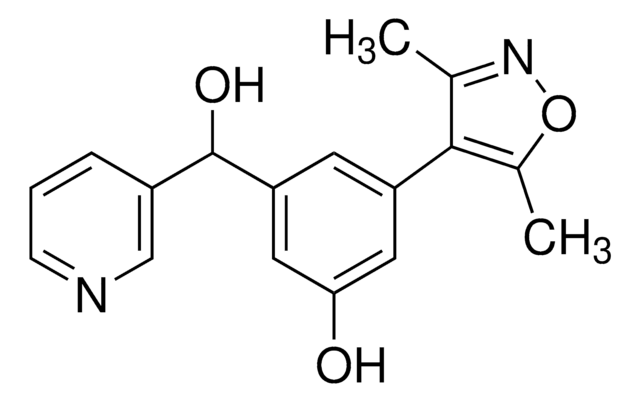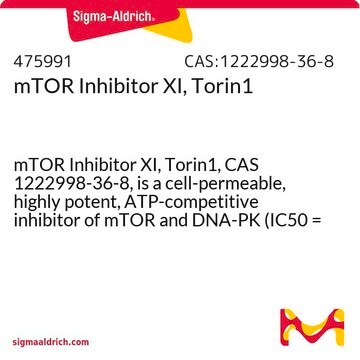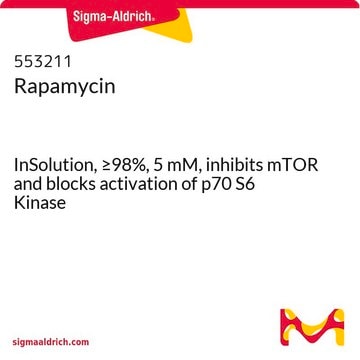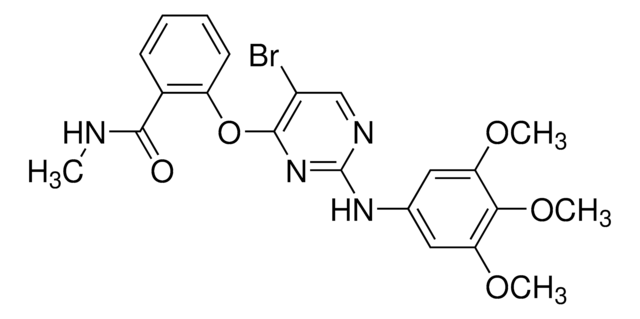SML2632
Autophinib
≥98% (HPLC)
Synonym(s):
6-Chloro-N-(5-methyl-1H-pyrazol-3-yl)-2-(4-nitrophenoxy)-4-pyrimidinamine, 6-Chloro-N-(5-methyl-1H-pyrazol-3-yl)-2-(4-nitrophenoxy)pyrimidin-4-amine
Sign Into View Organizational & Contract Pricing
All Photos(1)
About This Item
Empirical Formula (Hill Notation):
C14H11ClN6O3
CAS Number:
Molecular Weight:
346.73
MDL number:
UNSPSC Code:
12352200
NACRES:
NA.77
Recommended Products
Assay
≥98% (HPLC)
form
powder
color
white to beige
solubility
DMSO: 2 mg/mL, clear
storage temp.
2-8°C
Biochem/physiol Actions
Autophinib is an ATP-competitive, potent and selective PI3K type 3 lipid kinase vacuolar protein sorting 34 inhibitor (VPS34 IC50/[ATP] = 19 nM/10 μM & 51 nM/100 μM) that shows significant inhibition against only 45 kinases among a panel of >460 with little or no potency toward mTOR, TBK1 and 12 other phosphatidylinositol kinases (=22% inhibition at 1 μM). Autophinib effectively prevents autophagy induction in MCF7 cells upon amino acid starvation or rapamycin treatment (IC50 = 40 nM and 19 nM, respectively) with similar potency as SAR405 (IC50 = 53 nM and 20 nM, respectively) and VPS34-IN1 (IC50 = 13 nM and 15 nM, respectively). Autophinib enhances MCF7 cell death under starvation condition (EC50 = 264 nM and 234 nM by cytotoxiciy and apoptosis detection, respectively) by preventing autophagy-dependent cell survival.
Storage Class Code
11 - Combustible Solids
WGK
WGK 3
Flash Point(F)
Not applicable
Flash Point(C)
Not applicable
Certificates of Analysis (COA)
Search for Certificates of Analysis (COA) by entering the products Lot/Batch Number. Lot and Batch Numbers can be found on a product’s label following the words ‘Lot’ or ‘Batch’.
Already Own This Product?
Find documentation for the products that you have recently purchased in the Document Library.
Lucas Robke et al.
Angewandte Chemie (International ed. in English), 56(28), 8153-8157 (2017-05-26)
Autophagy is a critical regulator of cellular homeostasis and metabolism. Interference with this process is considered a new approach for the treatment of disease, in particular cancer and neurological disorders. Therefore, novel small-molecule autophagy modulators are in high demand. We
Klara Hanelova et al.
Cell communication and signaling : CCS, 21(1), 120-120 (2023-05-25)
Extracellular vesicles (EVs) are important mediators of intercellular communication in the tumour microenvironment. Many studies suggest that cancer cells release higher amounts of EVs exposing phosphatidylserine (PS) at the surface. There are lots of interconnections between EVs biogenesis and autophagy
André Richters et al.
ACS chemical biology, 10(1), 289-298 (2014-12-30)
The cytosolic Ser/Thr kinase TBK1 was discovered to be an essential element in the mediation of signals that lead to tumor migration and progression. These findings meet the need for the identification of novel tool compounds and potential therapeutics to
Our team of scientists has experience in all areas of research including Life Science, Material Science, Chemical Synthesis, Chromatography, Analytical and many others.
Contact Technical Service







